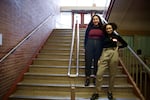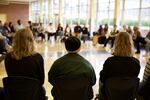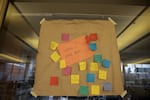Jada Commodore has a necklace that she lets dangle outside of her black turtleneck. It says: “Queen.”
Commodore sat in a circle with dozens of high schoolers from across Portland. She discussed topics she knows can be uncomfortable to discuss: colorism, miscegenation, the prison industrial complex, stereotypes about black women.
“I think that it’s very important to highlight black beauty,” Commodore told the students. “I think it’s very important to highlight black women as these beautiful, amazing creatures.”

Gabrielle Cosey, 17, and Jada Commodore, 18, say their goal is to expose students to difficult topics and get them talking about social issues outside of the classroom.
Ericka Cruz Guevarra / OPB
Commodore, an 18-year-old senior at St. Mary’s Academy, speaks comfortably about topics that can make other people squirm.
She warned the students that she’d spend the discussion using “raw or real” language. There was no sugarcoating.
She remembers the first time she learned to do this: She was 10, at a Portland Public Schools board meeting about budget cuts. Schools were closing. Programs were on the chopping block. Her friends’ parents were in attendance addressing the board, one after the other.
Then it was her turn. She faced then-PPS Superintendent Carole Smith.
“And I was like, 'Why would you ever do this?'” Commodore remembers telling the school board. “In my 10-year-old brain I was like, 'Why are you taking away things that are helping people? Isn’t the whole point of the role of the school board and the role of your job to help people?'”
That’s how she was introduced to the idea of social justice.
Eight years after that moment, Commodore was leading a discussion at Wilson High School, thanking Oregon Democratic Sen. Ron Wyden for attending a day of youth-led workshops on topics ranging from immigration to environmental racism.
“I really came to listen,” Wyden told the students. “This is not about me, but you.”

Students sit in a circle at Wilson High School discussing topics like race, white privilege, the prison system and stereotypes.
Ericka Cruz Guevarra / OPB
The idea, according to the students, is to get people talking about social issues openly. By starting the discussion about blackness and centering the ways black people are marginalized, Commodore said, students can learn to get comfortable with addressing difficult topics like racism.
Gabrielle Cosey, a 17-year-old senior at Lincoln High School, said the third annual "What Now?" event gives students a unique opportunity to have conversations outside the confines of the classroom.
“We never really get to examine current day politics, or current day social justice movements,” Cosey said. “It’s set within the parameters of whatever subject we’re being taught. We either have to go back in history, or look at it in a literature lens. And I think that’s limiting sometimes. And I think that’s why this space is unique, separate from schools.”
The event was a product of the 2016 election, said Natalie Sept, founder of What Now?.
“I had a lot of friends text me and ask me: What now? What do we do now?” Sept said. “I didn’t have the answers.”
So she set up an event to get people to turn their post-election energy into action. Local nonprofits and 2,000 attendees showed up to Revolution Hall. Most of them were white.

Students posted sticky notes about what they'd like to take away from the workshop.
Ericka Cruz Guevarra / OPB
“It didn’t reflect the full population of Portland,” Sept said.
Eventually, Sept would hand the event over to local students like Cosey and Commodore, who have since transformed it into a conversation-based workshop format with a focus on topics like systemic racism.
“We wanted to say, 'Look, this is your event now,'” Sept said. “I’m handing it over because this is the way this is going to change. This is the way the population is going to change, and we’re going to be able to see where the future of Oregon is going.”
During the opening discussion, students spoke about everything from gun violence in their schools to media representation of people of color.
One student from Reynolds High School spoke of a string of gang violence she’d noticed in her community.
“The news didn’t portray it well to me,” she told the group. “Lots of gang activity spills into the school system.”
Another student, who is white, said people are frequently discomforted by discussions around white privilege.
“There are so many people who are disadvantaged and it’s really important to be able to not just use your own voice to speak for them, but to raise them up,” the student said.
“Privilege is not bad when you’re using it to lift up people who are not privileged,” Cosey responded.
Addressing the students shortly before leaving, Wyden told them he was interested in hearing what issues the students would work on if they were in his shoes.
“Everyone,” he went on, “is going to be pooped here by the end of the day.”